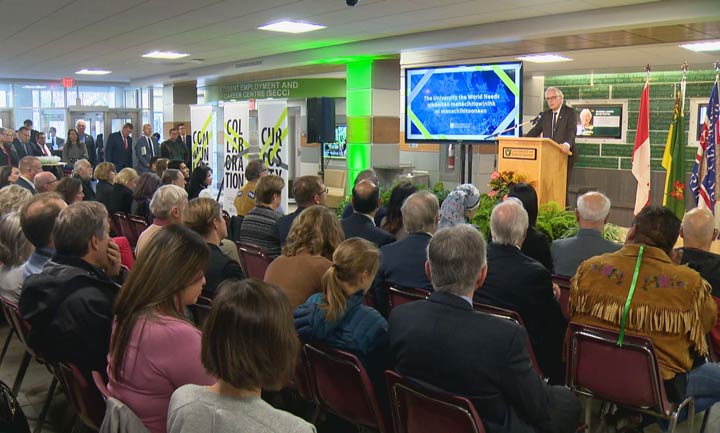The University of Saskatchewan (U of S) launched its new strategic plan which will guide them into 2025.

The plan features three key commitments – courageous curiosity, boundless collaboration and inspired communities – with a heavy focus on indigenization.
“We want it to be very clear that indigenizing and reconciliation was not just one commitment of several but flowed through all of the commitments,” U of S president Peter Stoicheff said Wednesday in Saskatoon.
According to Stoicheff, this will come in the form of additional Indigenous staff, continual increase of Indigenous students, building Indigenous knowledge into degree granting programs, signage with Indigenous languages and visible Indigenous culture on campus.
“Indigenization is one of the functional pillars of the university’s plan and because it is we start to engage within that conversation of what does that entail and how is that going to unfold within each one of our units, within each one of our colleges,” Indigenous engagement vice-provost Jackie Ottmann said.
“What I will be doing, is engaging in an Indigenous strategy that will compliment the university’s plan so there will be more specific principals and guide posts and direction for the university through that particular Indigenous strategy.
The plan, named The University the World Needs, also works to fulfil the university’s commitments to the Truth and Reconciliation Committee’s calls to action.
“Now we get to engage and redress and repair in healing, not only as an Indigenous community but as a society in general. So we do have a responsibility as a university to engage in reconciliation and to promote indigenization,” Ottmann said.
“We will know that we have made headway, when elders, when Indigenous students, when Indigenous leaders and Indigenous communities are telling us that we are,” Stoicheff said.
He added that they will also be looking to the Federation of Sovereign Indigenous Nations (FSIN) for feedback.
The goals of the plan include increasing enrolment to 28,000 students, increasing peer-reviewed funding and increasing interdisciplinary and collaborative programs and partnerships. It also hopes to improve academic rankings, enhance alumni engagement and continue to be a leader in indigenization.


Comments